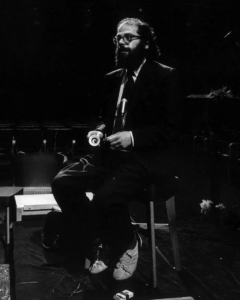
Hey Father Death, I’m flying home
Hey poor man, you’re all alone
Hey old daddy, I know where I’m going […]Guru Death your words are true
Teacher Death I do thank you
For inspiring me to sing this Blues […]Suffering is what was born
Ignorance made me forlorn
Tearful truths I cannot scornFather Breath once more farewell
Birth you gave was no thing ill
My heart is still, as time will tell.
Definitive and controversial Beat poet Allen Ginsberg wrote “Father Death Blues” on the plane en route to his father’s funeral. The funeral prompts Ginsberg — as funerals, especially those in one’s immediate family, often do — to examine his own mortality. He does this by personifying important figures in his world and how their “deaths” — along with their eternal influence — intermingle with his life.
He opens by speaking to the personified version of his father’s death (noted by its proper-noun capital lettering) casually letting it know he’s traveling home. Speaking to his actual father (noted with lower-case letters), Ginsberg implies that by making the final transition to death, his dad is now “all alone” — or, at least beyond the reach of human folk. Continuing, with a touch of sass, Ginsberg shares with “old daddy” that “I know where I’m going.” This reads as Ginsberg acknowledging the potential of being hellbound due to his subversion of the status quo (he is best known for the quintessential Beat poem “Howl,” which explored his homosexuality at a time when same-sex relationships were illegal).

Moving to stanzas where he explores deaths of important figures in his life — Guru, Teacher — his words illustrate how, even beyond the bodily passing of these mentors, there is an enduring element in lessons learned (“words”) from the Guru, as well as the permanence of this poem itself, inspired by Teacher Death and still extant even after death.
In the next stanza shared, he explores his experience as a gay man in an unwelcoming time. Born as he was with this sexuality, he was indeed born into suffering. Ignorance of society at that time made him “forlorn,” yet despite the pain and tears of his truth he is unable to “scorn” them, or live any way other than just as he is.
To close, he bids one last farewell to his personified Father’s Breath, essentially thanking his dad for his life — despite the tumult, it’s been a good one worth living, evinced by the fact his heart “is still” or unperturbed and at peace, “as time will tell.”
This is a conclusion any of us would be fortunate to reach.

 “Father Death Blues” by Allen Ginsberg
“Father Death Blues” by Allen Ginsberg


 First the Wealth Gap, Now the U.S. Has a Growing Health Gap
First the Wealth Gap, Now the U.S. Has a Growing Health Gap
 How to Comfort A Dying Loved One
How to Comfort A Dying Loved One
 Our Annual Seven Holiday Gifts for Someone Who Is Grieving, 2024 Edition
Our Annual Seven Holiday Gifts for Someone Who Is Grieving, 2024 Edition














